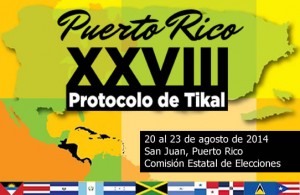The advance of electronic voting was one of the main topics of the 28th Conference of the Association of Electoral Bodies of Central America and the Caribbean (Tikal Protocol). This event was held in San Juan, Puerto Rico, between August 20 to 23 2014. The association brings together higher electoral authorities from its member countries and the Electoral Consulting and Promotion Centre (Capel), a body belonging to the Inter-American Institute of Human Rights (IIDH).
The person in charge of Capel’s programs, Sofía Vincenzi, explained that the main topics for this conference were electronic voting, and the administrative and financial management of electoral processes.
Vincenzi stated that the countries in the group (Costa Rica, El Salvador, Guatemala, Honduras, Jamaica, Nicaragua, Panama, Puerto Rico, the Dominican Republic and Saint Lucia) are moving towards electronic voting, but that every state has particular conditions that set them apart. “This meeting was a good occasion to exchange our experiences”, concluded Vicenzi.

The opening panel touched on the “administrative and financial management of electoral processes, and the daily operation of electoral bodies”, with conferences by Salvador Romero Balliván; Zetty M. Bou Valverde, magistrate of the Costa Rican Supreme Electoral Court; and Beatriz Galindo, electoral advisor for the Mexican National Electoral Institute.
The subject of electronic voting was explored by Juan Pablo Bozo, advisor of the Ecuadorian National Electoral Council, who was thankful for the special invitation to participate in this 28th conference extended by Ángel González Román, president of the Puerto Rico State Commission on Elections. “We have common goals, among them the promotion of an electronic vote counting system”, Bozo added.
He also added that the Ecuadorian National Electoral Council has shared objectives and challenges with the region’s electoral bodies, namely the use of technology in the service of democracy.
The Ecuadorian Sectional Elections held on February 23, had as a fundamental purpose the testing of electronic voting technologies in the provinces of Santo Domingo de los Tsáchilas and Azuay. These experiences will serve for later decision making during the upcoming elections, regarding the expansion of voting automation until the entire country is covered.
Smartmatic participated successfully in Santo Domingo de los Tsáchilas, which was acknowledged by Unasur, and stated in their final report for the Ecuadorian Sectional Elections. The observation organism showed satisfaction over the electronic voting system’s performance, its protection of the secrecy of the vote, its problem resolution mechanisms and in general, over it having met the objectives of automating the vote and ensuring the will of the people.